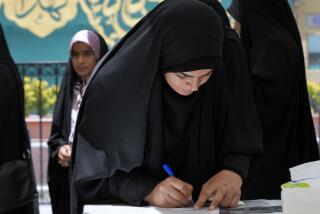Mullah Democracy
- Share via
Iranian officials Monday predictably declared last week’s presidential election free from rigging, extending the lie to its logical conclusion. Never mind that unelected Islamic clerics decided who could run and who could not or that the mullahs announced election results Friday ahead of the nation’s electoral commission.
Even the one bright spot in the campaign, dissent against the clergy that was broadcast across the land, didn’t last very long: The Tehran prosecutor’s office on Monday shut down a pro-reform newspaper that intended to print a letter from a defeated candidate accusing the country’s real ruler, Ayatollah Ali Khamenei, of letting minions engineer electoral fraud.
The official results gave the most votes to Hashemi Rafsanjani, who was president from 1989 to 1997, dark years for the country’s economy and civil liberties. A clergyman who was a champion of the 1979 revolution that replaced the shah with a theocracy, Rafsanjani has reinvented himself as something of a moderate who favors at least talking with Washington.
Because he did not receive 50% of the votes in the seven-candidate race, Rafsanjani faces the second-place finisher, Tehran Mayor Mahmoud Ahmadinejad, in a runoff Friday. From the U.S. standpoint, Rafsanjani looks good compared with Ahmadinejad, who is considered more hard-line than the former president and says better relations with Washington are not a priority.
Iranian officials said 62% of eligible voters cast ballots, far above what had been expected from a largely youthful population that did not experience the revolution and has been disappointed by the failures of the outgoing president, Mohammad Khatami. He stunned the conservatives with his victory in 1997 and won reelection in 2001, but was hamstrung by the clerics, who wield real power in Iran.
Iran’s intelligence and foreign ministers sarcastically thanked President Bush for increasing the turnout by criticizing the election as an exercise in futility. Bush was right, as Iranians well know, even if his remarks last week did serve to heighten indignation and possibly rally voters.
A key U.S. concern is Iran’s nuclear program. Iranian officials insist that they have the right to use nuclear energy, but Washington and other capitals worry Tehran will develop nuclear weapons.
Last week, investigators for the U.N.’s International Atomic Energy Agency said Iran had admitted experimenting with plutonium more recently than previously known. Plutonium can fuel nuclear weapons. So can enriched uranium, which Iran also is thought to want to produce.
Iranians are concerned about the economy, lackluster even with oil prices so high, and the need for jobs for its many young people. Reformers would be better off ending talk of boycotting the runoff and should instead vote for Rafsanjani.
Ahmadinejad would be a worse choice for Iran and the rest of the world, especially if Rafsanjani fulfills his promise of dialogue with the U.S.
More to Read
Sign up for Essential California
The most important California stories and recommendations in your inbox every morning.
You may occasionally receive promotional content from the Los Angeles Times.











